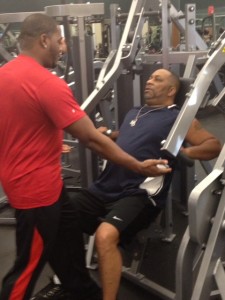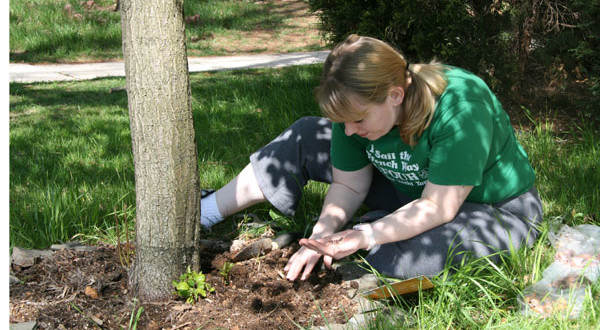by Michelle Sutton-Kerchner
It’s the time of year for baseball, landscaping, home repairs– and strained muscles from all of this sudden use. Sometimes that wrenching moment is unavoidable. When activity comes to a halt as you wince in pain, here’s your next (gentle) move …

Small muscle tears occur naturally after exercise or the strain of intense physical activity. During rest, especially during quality sleep, these microscopic tears repair themselves. This process makes the body stronger and more fit.
When the tears result from more than simple wear and use, you are no longer healing a happily fatigued body but an injured one. Recognize the difference between soreness from healthy use and something more significant.
Signs of Strain
Sometimes, it is tricky to tell the difference between post-workout soreness and a significant muscle strain. Signs of a strained muscle include:
- Pain (not discomfort) even when at rest
- Swelling, bruising, or redness at the site
- Pain when the area is used, including the joint and nerves surrounding it
- Weakness in the area
- Limited movement or inability to use at all
When to See a Physician
If pain is severe or lasts more than two weeks, consult with a medical professional. Better to prove it as a minor strain, than let a serious issue go unresolved. If the body tries to heal itself incorrectly, the rehabilitation process can be more challenging.
Your physician may prescribe diagnostic tests, such as an x-ray or MRI, to better understand the injury. Physical therapy also may be prescribed. The Center has on-site physical therapists through our hospital affiliation who can coordinate your rehabilitation program with fitness professionals for a safe post-therapy transition.
Work Out or Rest Up?

Studies continue to reveal the benefits of movement during recovery from a muscle strain. The exercises and intensity level of your workout may need to be adjusted to avoid further injury. As the body compensates for an injured area, it can hurt another by misalignment and improper form. It is natural to protect the area that is healing, which may cause overuse of other muscles and joints.
Consulting a personal trainer is important and helpful when resuming exercise following a muscle strain. S/he can help create a gentle, progressive workout to help keep you fit as you recover. The hospital’s on-site physical therapy department can work closely with fitness trainers and instructors to transition your workout as you progress. With professional guidance, you often can benefit from exercise without risk of further injury. The right stretches and movements even may accelerate healing while avoiding muscle atrophy.
A personal trainer also can help you better understand why the injury may have occurred. Perhaps core muscles are too weak to support back muscles. One swing of the golf club and hello back pain. Whenever possible, establish the underlying reason for the strain or injury. This is necessary to customize a safe, effective workout that may prevent the injury from reoccuring. Learn from this setback and grow.
Ask Group Fitness instructors which classes might be helpful, and how you can modify them to accommodate your healing process. Perhaps workout in the pool and be soothed by the water. There’s always the heated spa pool! Be mindful of your injury during every type of workout. Take it slow. Stop if you experience any pain. Rest often.
 Everyone needs a refresher on the best way to quickly heal a strained muscle. Springtime makes the earth a playground. Some of us haven’t played since the leaves of fall were raked. Keep these tips in your mind and an ice pack in your freezer, just in case. You never know when a spring to-do list may require lifting one too many potted plants.
Everyone needs a refresher on the best way to quickly heal a strained muscle. Springtime makes the earth a playground. Some of us haven’t played since the leaves of fall were raked. Keep these tips in your mind and an ice pack in your freezer, just in case. You never know when a spring to-do list may require lifting one too many potted plants.
Sources
“How to Treat a Pulled Muscle in 7 Steps,” by K. Aleisha Fetters at fitnessmagazine.com
webmd.com
Image Credits
Gardening (introductory photo): flickr.com/photos/lollyknit/469145710/
Potted plants: pixabay.com/en/flowers-flower-pots-plant-colorful-508204/
 Fitness & Wellness News Your Source for Fitness News, Wellness News, Health News, and Nutrition News!
Fitness & Wellness News Your Source for Fitness News, Wellness News, Health News, and Nutrition News!




